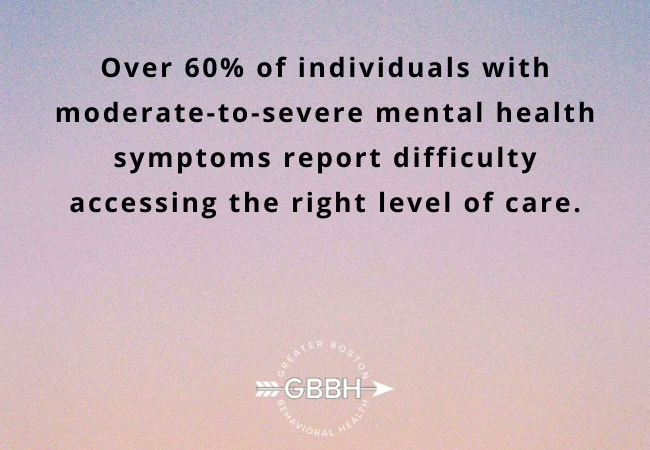Mental health struggles can be complex. For some, weekly therapy sessions may be enough to maintain emotional wellness. But for others, symptoms can grow too intense to manage alone—yet not severe enough to require inpatient hospitalization. That’s where a Partial Hospitalization Program (PHP) offers a critical middle path.
At Greater Boston Behavioral Health, our Partial Hospitalization Program in Boston provides intensive, structured care for individuals who need more than traditional outpatient therapy. Whether you’re navigating a mood disorder, trauma, anxiety, or anger management challenges, PHP can give you the tools and support needed to regain stability—without committing to 24/7 inpatient care.
In this blog, we’ll explore who benefits most from PHP, how it differs from other treatment levels, and the warning signs that indicate it might be time to seek a higher level of support.
What Is a Partial Hospitalization Program (PHP)?
A Partial Hospitalization Program is a structured mental health treatment program that typically operates five days a week, for 4–6 hours per day. It provides a therapeutic environment where clients can engage in:
- Individual therapy
- Group therapy
- Psychiatric care and medication management
- Psychoeducation
- Skills development (CBT, DBT, mindfulness)
- Aftercare and discharge planning
At Greater Boston Behavioral Health, our PHP is designed to bridge the gap between inpatient hospitalization and traditional outpatient therapy, making it a vital component of our Mental Health Programs in Boston.
Who Benefits Most from a PHP?
PHP is ideal for individuals who are experiencing moderate to severe mental health symptoms that interfere with daily functioning but don’t require 24-hour supervision.
You may benefit from PHP if:
1. You’re Struggling with Emotional Regulation
If you feel like your emotions frequently spiral out of control, leading to impulsive actions, angry outbursts, or relationship conflicts, PHP can help. We use Cognitive Behavioral Therapy Boston and Anger Management Therapy in Boston to help clients develop emotional control and reduce reactivity.
2. You’ve Outgrown Outpatient Therapy
Weekly therapy may no longer be enough. If you’re not making progress—or you’ve experienced a setback—you may need more frequent and intensive therapeutic support that PHP offers.
3. You’re Transitioning from Inpatient or Residential Care
Many individuals leaving an Inpatient Treatment Program in Boston or Residential Treatment Program in Boston still need structure to maintain progress. PHP offers a safe step-down level of care to support ongoing recovery.
4. You’re Facing Daily Life Challenges Due to Mental Health Symptoms
If your anxiety, depression, trauma, or mood swings make it hard to hold a job, attend school, or maintain relationships, PHP gives you the space and support to stabilize.
5. You Have Co-Occurring Disorders or Complex Diagnoses
Our Mental Health Treatment Center Boston specializes in treating individuals with dual diagnoses (e.g., depression + substance use, anxiety + trauma). PHP provides daily clinical support while helping you manage multiple conditions simultaneously.
Common Mental Health Conditions Treated in PHP
At Greater Boston Behavioral Health, our PHP supports clients with a wide range of diagnoses, including:
- Major depressive disorder
- Generalized anxiety disorder and panic disorder
- Post-traumatic stress disorder (PTSD)
- Borderline personality disorder (BPD)
- Bipolar disorder
- Obsessive-compulsive disorder (OCD)
- Emotional dysregulation and chronic anger
- Dual diagnosis (substance use + mental health)
Warning Signs That You May Need PHP
Not sure if your current level of care is enough? Here are key warning signs that indicate a Partial Hospitalization Program may be the right next step:
1. You’re Feeling Emotionally Overwhelmed Most of the Time
If sadness, anger, or anxiety feels like it’s dominating your days—and you’re struggling to stay grounded—this is a sign your coping strategies may need reinforcement through structured therapy.
2. You’re Isolating from Others
Avoiding friends, family, school, or work responsibilities is a red flag. PHP provides a social and therapeutic structure that breaks the isolation cycle.
3. You’ve Had Recent Suicidal Thoughts or Self-Harm Urges (But Don’t Require Inpatient Care)
If you’re not actively suicidal but have been having concerning thoughts, PHP offers a supportive and supervised setting with access to Psychiatric Care in Boston and daily therapeutic support.
4. You’re Unable to Maintain Daily Functioning
When it becomes difficult to complete basic tasks—like showering, eating, commuting, or concentrating—it may be time to seek a higher level of care that offers more frequent interventions.
5. Your Relationships Are Suffering
If your mental health is leading to frequent conflict, emotional withdrawal, or breakdowns in communication, PHP can help you rebuild healthy relationship skills and strengthen boundaries.
Therapies Offered in Our Partial Hospitalization Program
At Greater Boston Behavioral Health, we offer customized therapeutic programming designed to meet each client’s individual needs. Our PHP includes:
Cognitive Behavioral Therapy (CBT)
Teaches clients to reframe negative thought patterns and change destructive behaviors. Effective for depression, anxiety, and anger.
Dialectical Behavior Therapy (DBT)
Focuses on mindfulness, emotion regulation, distress tolerance, and interpersonal effectiveness. Ideal for emotional dysregulation, trauma, and BPD.
Anger Management Therapy
Provides skills for identifying triggers, practicing self-regulation, and responding assertively without aggression.
Psychoeducation and Process Groups
Helps clients understand their diagnoses, explore past patterns, and build insight in a safe group setting.
Mindfulness and Stress Management
Promotes nervous system regulation through breathing techniques, meditation, and body-based awareness.
Medication Management and Psychiatric Care
Our in-house psychiatry team monitors and adjusts medications as needed, ensuring medication is aligned with your overall treatment goals.
How PHP Compares to Other Levels of Care
| Level of Care | Intensity | Best For |
|---|---|---|
| Outpatient Therapy | 1x/week sessions | Mild symptoms, maintenance |
| Intensive Outpatient Program in Boston (IOP) | 3–5 days/week, 2–3 hours/day | Moderate symptoms, high-functioning clients |
| Partial Hospitalization Program in Boston (PHP) | 5 days/week, 4–6 hours/day | Moderate-to-severe symptoms needing daily structure |
| Inpatient Treatment Program in Boston | 24/7 care | Acute crisis, suicidal ideation, psychosis |
| Residential Treatment Program in Boston | 24/7 therapeutic setting | Long-term healing, dual diagnosis, or treatment-resistant disorders |
Why Choose Greater Boston Behavioral Health?
At Greater Boston Behavioral Health, we understand that navigating mental health treatment can be overwhelming—especially when your current support isn’t enough, but 24/7 care feels too extreme. That’s why our Partial Hospitalization Program in Boston is built to bridge that exact gap with clarity, compassion, and clinical excellence.
Here’s why individuals and families trust us:
Tailored, Evidence-Based Treatment
We use proven therapeutic models like Cognitive Behavioral Therapy Boston and Dialectical Behavior Therapy in Boston to help clients break through emotional roadblocks and build real-life coping skills. No generic approaches—only care that’s personal, intentional, and results-driven.
Full Spectrum of Care Under One Roof
Whether you’re stepping down from our Inpatient Treatment Program in Boston or stepping up from outpatient therapy, our PHP is part of a seamless continuum that includes IOP, residential care, and psychiatric support. We’ll meet you where you are—and guide you where you need to go.
Compassionate Professionals, Comfortable Environment
Our team is made up of licensed clinicians, experienced psychiatric providers, and support staff who are deeply committed to your well-being. We’ve created a safe, stigma-free space where healing isn’t just encouraged—it’s expected.
Skills You Can Apply Outside the Program
Through our focus on anger management, trauma recovery, emotional regulation, and mindfulness, you’ll learn practical tools that you can carry into your relationships, work, school, and everyday life—long after treatment ends.
Conclusion
If your current treatment isn’t enough—or if you’ve been trying to cope without support—there’s help available. A Partial Hospitalization Program can offer you the consistency, structure, and therapeutic depth needed to regain your footing and move forward.
At Greater Boston Behavioral Health, our team is here to walk with you through each stage of recovery. Whether you’re struggling with depression, trauma, mood swings, or anger, you deserve care that meets your needs with compassion and expertise. Call us today at (888) 278-0716 to speak with our admissions team and start building a healthier, more grounded future.
FAQ on Partial Hospitalization Program (PHP)
What is a Partial Hospitalization Program (PHP)?
PHP is a structured mental health treatment program that offers intensive therapy, psychiatric care, and skill-building during the day while allowing clients to return home at night.
Who qualifies for a PHP?
PHP is ideal for individuals with moderate to severe mental health symptoms who don’t require 24/7 inpatient care but need more than weekly outpatient therapy.
What conditions are treated in a PHP?
PHPs treat depression, anxiety, trauma, bipolar disorder, personality disorders, emotional dysregulation, and co-occurring disorders. It’s also highly effective for anger management.
How long does PHP last?
Most PHPs run for 2–6 weeks depending on individual progress. Clients typically attend 5 days per week for 4–6 hours per day.
Can I go to PHP after inpatient treatment?
Yes. PHP is often the next step after inpatient care or a Residential Treatment Program in Boston. It helps clients maintain progress while reintegrating into daily life.


